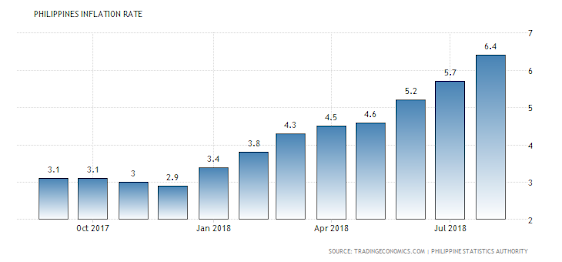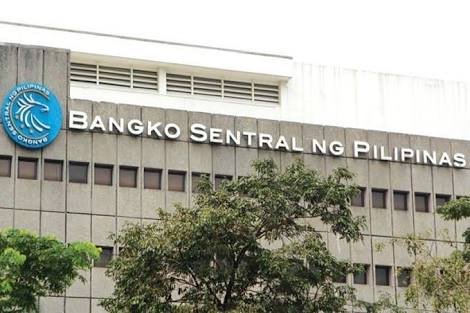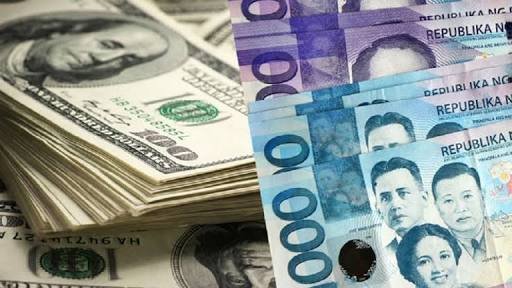How does an Economists perspective on inflation! Philippines!
Economists perspective on inflation!
(Disclaimer: This is an fb post of one of one friend, Prince Pardo. I did not edit anything for the purpose of giving all the credit to him. This is a very nice read.)

#Usapangekonomiya
A) How does it affect us?
Let me explain. If a person is earning P10,000.00 per month, his/her income has devalued by 6.4% because of inflation. Devaluation means the reduction of value of a currency. In lay man’s term, we lost (nalugi) by 6.4% or P640.00 pesos per month.
Is it bad? Of course, yes. That P640 means fare money, fuel money or rice money for ordinary citizen.
But look at the chart of the Regional Minimum Wage History. In 2017 the Minimum Wage was P340/ day. And as of this month, it rose to P370/day. That means, a P30/day increase in payroll is equivalent to an 8.8% increase of people’s income. So if we think about it, did we really lose? No. Even if the prices increased due to inflation, we still gained because our wages rose by 8.8% . So the notion and comments that say, the Filipinos are getting poorer because of inflation is not accurate. Because that has been answered by the increase in Salary. If we lost P640 per month because of Inflation. It has been compensated with a P900 peso (rounded off), increase per month now. Numbers don’t lie. So that’s kinda difficult to refute.
Plus of course, let us not forget the Train Law. Our employees earning P250,000.00 below per year has zero tax payable now compared to the 10% Withholding Tax in the past. Is that not savings for ordinary employees? I rest my case.
So If you are poor now, chances are, the reason isn’t inflation. It must be you not working or not budgeting well. Living above your means is worst than inflation, you know. 😊
😎 Central Bank of the Philippines:

True, it is the job of our Central Bank to manage our currency. But let me correct those who blame them for not doing their job.
Why? Because the Foreign Exchange (FOREX) market is worth $5 Trillion Dollars per day. These are all the currencies in the world, trading, PER DAY. And you know how much is the Annual Gross Domestic Product of the Philippines? Record shows $313.6 Billion Dollars as of 2017.
What is the importance about that? Let me elaborate. All currencies in the world are pegged against the US Dollar. Looking at the chart, US GDP rose to $19390.6 Trillion Dollars in 2017 compared to $18624.48 Trillion Dollars in 2016. This means that from a slump in 2016, it recovered a little bit on 2017. These numbers show that investors have been buying the US Dollars more than the other currencies in the world.
The other side of the coin is = selling of the other currencies. You know, when investors buy US Dollars, they SELL their Peso, Yen, Deutschemark, British Pound, etc.
For example, you want to go to the US. And you need US Dollars, you bring your peso to Aldevinco and exchange it. In effect, the tourism industry in the US gained from your travel. And you just sold your Philippine Peso to buy the dollar. That is trading locally.
Forex is a trillion times larger.
And when speculators all over the world buy the dollar, the US currency gets stronger. And THERE IS NOTHING OUR CENTRAL BANK CAN DO about that. You just allow the Peso to fall or depreciate. Because even if CBP wants to defend the Philippine Peso in the Forex Market, they cannot. The Central Bank of the Philippines cannot afford it. That’s how George Soros broke the Bank of England. He hedged against their currency. The Bank of England defended their money but eventually gave up. This transaction made George Soros the best currency speculator in the world back in the 90’s era.
So think about this, what can a $300 billion dollar economy (our economy) do to a $5 Trillion Dollar per day industry? None. We will go bankrupt if we even try. Do you get my point?
For proper perspective, let me point out this comparison. According to Forbes, the Richest Man in the World is Jeff Bezos, the CEO of Amazon. He is worth $112 Billion Dollars as of 2017.
He is 1/3 of the Philippines net worth. Has that figure sunk in yet? Yes you are right my friends. That just showed how poor the Philippines is.
And Jeff Bezos is just one man. In the trading world, think of George Soros and the other big time traders. The peso does not have a chance against those who prefer to buy the US dollars. None at all.
So yes, when you blame the Philippine Central Bank for the peso devaluation, it just shows how little you know. There are always 2 sides in every story. And this is the other side of it.
Why A Cheaper Peso Is Okay.

Record shows that as of 2017, the largest chunk of the Philippine Income came from the Export Industry. What does this mean for our exporters?
Example: Past Year – P51/ 1 USD
Now - P53 / 1USD
If our exporter delivers worth 1 Million Dollars of goods, the equivalent now is higher than before. Right? If it used to be P51,000,000.00 pesos, now our exporters are receiving P53,000,000.00 pesos. That’s a huge rise of our exporters and their employees’ income. Tell me, is it good or bad? And that’s how the export industry became the largest source of income in our country last year. Next to that is the BPO industry which is also a dollar earner. And like I mentioned in my previous article, our OFW’s is a big part of our income too. I’m sure they are happy with the exchange rate these days.
If your complain is that you are dependent on imported goods, then you are out luck. Because buying the US dollar is so expensive now against your Peso. The lesson here is, refrain from buying imported goods or traveling abroad if you cannot afford it. Bottom line really is how much can you and can you not afford. If you are complaining, that means you can’t. Afford anything imported, that is.
Or if you have dollar loans, then save and pay it now! Refrain from buying crap you don’t really need. And concentrate of paying your dollar bills. That is simple economics.
TECHNICAL FORECAST:
There is an upward trend on the Philippine Peso. Meaning, it will continue to devaluate. Initial target is P54/per 1 dollar. Then off to P55/per 1 dollar.
This is bad for our importers and those who buy imported goods. Or to those who love to travel abroad. But like I said, don’t spend if you can’t afford it.
So why does a Cheaper Peso Okay? Consider this:
A cheaper peso means more dollar value for our Foreign Investors. Now is the time to think of investing in the Philippines because the US dollar will go a long way here. Labor is cheap. Raw materials are cheaper than most. Most Filipinos speak good English. And most importantly, the peso is very cheap now. So it is attractive to foreign investors.
If we focus on this rather than dwell on the negative, let us entice everyone to come to our country and invest. That way, our 95.3% employment rate will go higher. More jobs for the Filipinos mean lower Poverty Rate.
Thoughts from an Economists and our great professor.
© Jun Evangelio